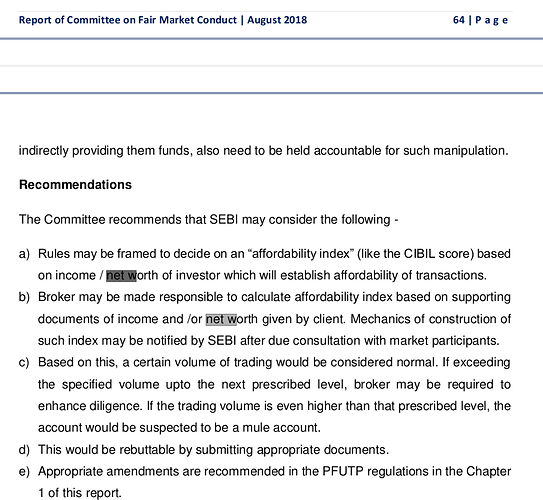Several news item are doing round that SEBI is mulling implementing trading/investing limits on retail investor.
SEBI seeking public comments
SEBI seeks public comments on Report submitted by the Committee on Fair Market Conduct
Brief about the committee
SEBI constituted a Committee on Fair Market Conduct in August, 2017 under the Chairmanship of Shri T.K. Viswanathan, Ex-Secretary General, Lok Sabha and Ex- Law Secretary. The Committee was mandated to review the existing legal framework to deal with market abuse to ensure fair market conduct in the securities market. The Committee was also mandated to review the surveillance, investigation and enforcement mechanisms being undertaken by SEBI to make them more effective in protecting market integrity and the interest of investors from market abuse. The Committee comprised of representatives of law firms, mutual funds, brokers, forensic auditing firms, stock exchanges, chambers of commerce, data analytics firms and SEBI.
The committee has submitted its report to SEBI on August 08, 2018 wherein it has recommended amendments to SEBI Act,1992, SEBI (Prohibition of Insider Trading) Regulations, 2015 and SEBI (Prohibition of Fraudulent and Unfair Trade Practices relating to Securities Markets) Regulations, 2003.
Full Report
The full report of the committee can be accessed here.
Relevant section of report
Page 64 of the report under sub-title - Discouraging Layering of Funds gives the reasons and the following recommendations
This thread is to discuss implications of this on retail investors and keep community up-to-date on any new developments.
2 Likes
The road to hell is paved with good intentions.
Seems like work of a hyper creative SEBI. It took an interesting concept from advanced world “Accredited Investor” and is trying to implement it in Indian concept with no correlation whatsoever.
An accredited investor is a person or entity that can deal with securities not registered with financial authorities by satisfying one of the requirements regarding income, net worth, asset size, governance status or professional experience. (Source : Investopedia)
It should be noted that Accredited investor concept applies to unregulated financial instruments that are not monitored by SEC and there are no networth or any other requirements for SEC monitored instruments like listed stocks, bonds etc.
Secondly, any SEBI order regarding this will be vigorously challenged in courts as it infringes upon the individual’s right of freedom of work guaranteed by the constitution.
Any profit or loss that an individual investor makes trading in financial assets is the sole responsibility of that individual only. As long as any person is trading in legally earned income and paying applicable taxes on it, the Govt has no right to interfere in it, IMHO.
12 Likes
This was a committee on Fair Market Conduct and dealt with issues such as market manipulation and insider trading. The above passage appears in ‘Discouraging layering of funds’ where the report says SEBI has encountered cases where individuals without the wherewithal to commit economic offences are used as a front by the actual offenders (“mule accounts”). Therefore, the report proposes brokers should calculate and maintain an “affordability index”. It talks about ‘normal volume of trading’ for an individual beyond which broker has to perform enhanced due diligence to ensure that the account is not a mule account. In other words, the investor should prove to his broker that he is not a front for somebody else and can afford to do what he is doing. Of course, how this will help is another matter altogether since an investor can have accounts with multiple brokers.
But from this recommendation to the headline “SEBI plans to cap investors’ equity exposure in line with net worth” is quite a stretch! The headline implies SEBI capping an investor’s asset allocation itself, which is not what the report says. SEBI report has no mention of the term ‘accredited investor’ which is a totally different concept and on which the entire ET report is based. All this just seems like “normal” misreporting and sensationalism for which our media is famous.
Long term buy-and-hold investors have nothing to fear by this development.
4 Likes
Why limit this logic merely to investment in shares. This (twisted) logic would very well apply to most non-essential expenses. For eg, even cars, TVs etc are marketed aggressively and for quite a few people these expenses are a significant portion of their net worth (sometimes even more than their net worth). Does that mean that govt should mandate how much net worth is needed for, say, buying particular car models so as to prevent people form overextending their budgets.
And while we are at it, why not extend this logic even to FMCG items. After all, shouldn’t the nanny state be deciding the minimum income levels for, say, purchasing expensive tooth pastes, soaps, etc so as to save low income households from excessive routine expenditure !
2 Likes

